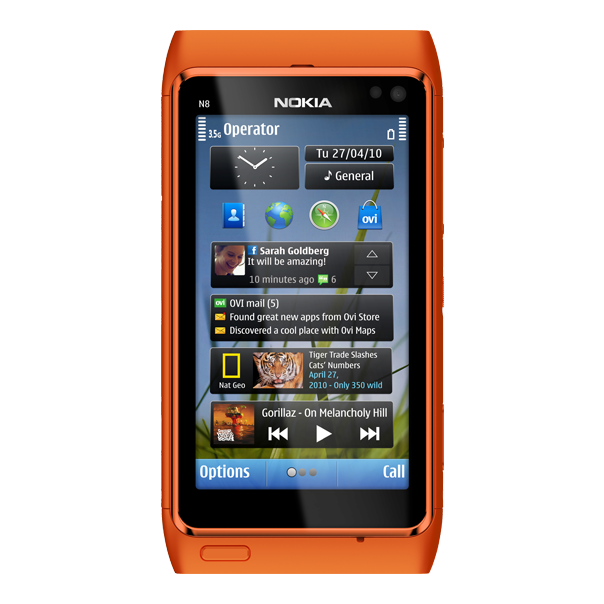Nokia: Doomed to be a zombie company?


Will Android make you buy this phone?
Nokia reported a mixed fourth quarter, gave a weak first quarter outlook and hinted that it may consider another mobile operating system to become more competitive.
The financial picture is decidedly so-so. The short version: Nokia's market share was 32 percent in mobile devices in 2010, down from 34 percent in 2009. Nokia's fourth quarter sales were €12.7 billion, up 6 percent from a year ago. Fourth quarter profit was €745 million, down from €948 million a year ago. As for the first quarter, Nokia projected first quarter profit margins of 7 percent to 10 percent, down from 11 percent a year ago.
The big question: What exactly is Nokia going to do to become more competitive?
Nokia's master plan is allegedly going to be revealed Feb. 11 at a strategy session. The tech buzz revolves around Nokia CEO Stephen Elop's comments on a conference call hinting that Android or Windows Phone 7 may be in the company's future.
Via Reuters, Elop said "we must build, catalyze or join a competitive ecosystem." Naturally, those comments led to the idea that Nokia would launch an Android phone and enter the U.S. market.
It's really hard to get wound up about this Nokia-Android enthusiasm. When I look at Nokia, I have to wonder if it's just a zombie company. Elop acknowledges that Nokia "faces some significant challenges in our competitiveness and our execution." Elop added that "the industry changed, and now it’s time for Nokia to change faster."
So let's project forward a few days and see how Nokia is going to launch its big turnaround project. Here's a look at a few likely scenarios:
Scenario 1: Nokia goes Android happy. Nokia could go with Android and use that OS as an entry to the U.S. market where the company is a no-show. Nokia's hardware and Android could create a killer device. Meanwhile, Nokia could put some structure around an Android app marketplace.
- The pros to this approach: Nokia would outsource its software. Today, Nokia is a hardware company that dabbles in software (much like Research in Motion). With Android, Nokia could focus on scale.
- The cons: A Nokia Android phone would enter a crowded marketplace. Nokia, which is under fire from HTC, Motorola and Samsung, would just be another handset on an Android shelf.
- Wild-card: Carrier support. Nokia would have to give carriers big subsidies and a bunch of other carrots to get any marketing support. In the U.S., consumers barely know Nokia. What would Nokia have to do to get the cool kids to try it?
Scenario 2: Nokia goes with Microsoft Windows Phone 7. Under this scenario, Nokia could offer Windows Phone 7 devices. Microsoft has a fine mobile operating system, but it's unclear how the market is receiving them.
- The pros: Familiarity and skin in the game. Elop is a former Microsoft man. There's comfort there. Nokia and Microsoft could need each other. Nokia gives Microsoft a mobile lift. Microsoft gives Nokia an OS. It could be a match made in mobile heaven. And the Windows Phone 7 app ecosystem is credible.
- The cons: Can you take two middling players in the mobile market (at least in the U.S.) and create a juggernaut? History says you can't.
Scenario 3: Nokia makes a big push in the U.S. and devices hit Verizon, Sprint and AT&T. Elop has noted that the U.S. market is a big problem. The charts below tells the tale. Nokia is pathetic in the U.S.
How will Nokia reverse that picture? Elop could schmooze carriers and offer big subsidies for promotion. If Nokia is going to be a player it will have to pay up.
- The Pros: Nokia could get exposure to the U.S. market.
- The Cons: Just because Nokia is in front of U.S. consumers doesn't mean they will actually buy devices when the two largest carriers have the iPhone and an army of Android (not to mention BlackBerry and Windows Phone 7) devices. Nokia's OS choice may allay some of these worries.
Scenario 4: The company continues to chug along as a global player and makes a lot of headway in China and emerging markets.
- The Pros: Nokia could still be a profitable company without the U.S. hassle.
- The Cons: Nokia becomes a zombie that can't recapture its glory days.
None of those aforementioned scenarios give me any gadget lust for a Nokia phone. And I'm probably not alone. Android isn't going to lift Nokia up all by itself.
Related: Android stomps Nokia's X7 at AT&T
- Nokia and Microsoft’s Windows Phone 7: It could work, but why stop there?
- The Nokia N8; uncompromising specifications and functions in the smartphone world
- Nokia cuts workers, consolidates dev platforms, posts profit
- Nokia: Can it afford to avoid Android much longer?
- Can a Microsoft man fix Nokia? Here are 6 things that have to happen